The Democrat’s presumptive nominee Joe Biden will name his running mate as early as next week, and Congressional Black Caucus Chair Rep. Karen Bass (D-CA) is reportedly a top contender for the job.
The California Democrat has emerged as the favorite pick of former Sen. Chris Dodd, who serves on Biden’s vice presidential search committee. According a source who spoke with Politico, Dodd has urged Biden to choose Bass because “she’s a loyal No. 2. And that’s what Biden really wants.”
On the surface, Bass’s background as a former medical professional and South Los Angeles community organizer make her an attractive candidate to serve at a time when public health and racial inequality are on the top of voters’ minds.
Her resume bears the hallmarks of a rising political star, starting with her first foray into elected office 16 years ago, when she won a seat in the California State Assembly and later became the first Black woman in the country to serve as the speaker of a state legislature when she assumed the Speakership in 2008. Prior to this, Bass worked as a physician assistant and a left-wing community activist who founded a non-profit in the 1990s called the Community Coalition. She made headlines after the 1992 L.A. riots for her fight to prevent liquor stores from being rebuilt in the neighborhoods destroyed by the uprising.
In 2010, Bass won her U.S. House seat, where her voting record has been typical of a progressive member of a Democratic Party increasingly embracing socialism.
However, a deep dive into Bass’s background reveals that her influences were not just socialist, but hardcore communist.
The VP vetting process brought renewed scrutiny to comments Bass made about Cuba’s communist dictator Fidel Castro. In a statement following Castro’s death in 2016, Bass referred to him as “Comandante en Jefe” and described his death as “a great loss to the people of Cuba.”
The honorific “Commandante en Jefe”—which translates to “commander in chief”—was criticized by Florida Democrats for being excessively deferential to a dictator with a long history of human rights abuses.
In an interview with MSNBC on Sunday, Bass attempted to walk back her use of the term. “I have talked to my colleagues in the House about that, and it’s certainly something that I would not say again,” Bass said. “I have always supported the Cuban people, and the relationship that Barack Obama and Biden had in their administration in terms of opening up relations.”

President Barack Obama and Cuban dictator Raul Castro do the wave at a Major League baseball exhibition game in Havana on March 22, 2016. (Granma)
When the interviewer asked her how she would “characterize the Castro regime and its legacy,” Bass said: “I think the Castro regime and its legacy is very troubling.” However, a moment later, she appeared to dismiss the significance of Castro’s crimes by saying: “But you know what? I mean, we could talk all evening. I could tell you about a number of regimes that I think are very troubling in a variety of different ways.”
Bass’s walk back has not quieted questions about her electability in the battleground state of Florida with its large population of Cuban Americans whose families fled Castro’s murderous regime.
But these comments are merely the tip of the iceberg when it comes to Bass’s long and troubling association with communism and the communist regime in Cuba.
GROWING UP WITH ‘RED DIAPER BABIES’
Bass discussed her earliest political influences growing up on the Westside of Los Angeles and attending Alexander Hamilton High School in a 2008 interview with progressive authors Darnell Hunt and Ana-Christina Ramon for their book Black Los Angeles: American Dreams and Racial Realities.
“Many of Karen Bass’s early influences, as she notes, were among the city’s most prominent white and Jewish leftists,” the authors write.
Bass told them:
It [the white Left] played a huge role for me. In Hamilton [High School] for example, a lot of the Jewish parents were activists and some of them were in the Communist Party. And so I grew up with a lot of red diaper babies. And there were some African American parents who were in the Communist Party. There were teachers who were in the Communist Party. So, white radicals were very influential. And at the same time you have the Panthers and the whole black movement.
“Red diaper babies” is a slang term used to describe children of members of the Communist Party USA during the Cold War.
This 2008 interview would not be the first or last time that Bass talked about her communist influences. On January 30, 2017, Bass took to the floor of the U.S. House to eulogize her “friend and mentor” Oneil Cannon, who was a leading member of the Communist Party USA. In its obituary for Cannon, the communist website People’s World noted his work as the Communist Party USA’s education director in the Southern California District and as a member of the Party’s Southern California and National Central Committees.
“These are not accidental or incidental connections whatsoever,” author and 1960s historian David Horowitz told Breitbart News.
Horowitz, a “red diaper baby” and self-described former radical, was the intellectual founder of the New Left movement in the 1960s and co-editor of the leading radical magazine of the era, Ramparts.
Horowitz said Bass’s praise of communists “doesn’t happen by accident” and was not a default position for idealistic leftists of Bass’s generation. “There was a New Left movement which distanced itself from the Communist Party. We despised the communists. You could be a radical, and you didn’t have to be connected to the Communist Party. She’s obviously deeply into it.”
Those connections run especially deep when it comes to Bass’s involvement with the Venceremos Brigade.
LEADER OF A COMMUNIST FRONT GROUP
Over the years, Bass has spoken frequently about her decades-long involvement with the Venceramos Brigade (VB), starting from the time she was 19-years-old in 1973. She would make at least eight trips to Cuba in the 1970s and more in the decades that followed.
Articles about her work with the Venceremos Brigade make it sound like the Cuban equivalent of Habitat for Humanity or any other praiseworthy volunteer organization providing humanitarian assistance in poor countries.
In fact, the Venceremos Brigade was a Cuban communist front group founded in 1969 by Fidel Castro and the radical members of the Students for a Democratic Society (SDS). The Brigade was run by the Cuban intelligence service, the General Directorate for Intelligence (DGI).
Horowitz and his fellow Ramparts editor, Peter Collier, explained the origins of the Venceremos Brigade in their 1989 book Destructive Generation:
In 1969, a group of radicals including SDS leader Bernadine Dohrn and Castro apologist Saul Landau traveled to Cuba to meet with the Vietnamese and launch the Venceremos Brigade. The ostensible reason for this effort was to provide help for the Cuban sugar harvest. The real reason was to meet Cuban and Vietnamese officials in Havana to map out strategies for the war in America, the “other war,” which would ultimately defeat the United States in a way that the battlefield situation in Vietnam never could have.
The public rationale for the Venceremos Brigade was to organize six-week work trips for American volunteers to assist Cubans in harvesting Castro’s sugar cane crop. “The first thing Castro did when he came to power was ruin Cuba’s economy,” Horowitz said. “The big propaganda was that the imperialists had made Cuba a one crop country, which was sugar cane. And under Castro the production of sugar cane went down dramatically. And so they called on American volunteers to help them harvest sugar cane. But they also trained them politically.”

Fidel Castro cutting sugar cane on February 13, 1961. (AP Photo)
A 400-page FBI report from 1976, based on information obtained from former Cuban intelligence officers, explained that the Venceremos Brigade was used as a recruitment tool to co-opt American radicals as assets for the communist regime by fostering revolutionary fervor, which sometimes included guerrilla training.
“A very limited number of [Venceremos Brigade] members have been trained in guerrilla warfare techniques, including use of arms and explosives,” the report stated. “This type of training is given only to individuals who specifically request it and only then to persons whom the Cubans feel sure are not penetration agents of American intelligence.”
The Venceremos Brigade was not just a harmless volunteer organization helping the Cuban victims of American “imperialism.” It was a communist front group controlled and organized by the Cuban intelligence service, which was itself an extension of the Soviet intelligence service at a time when Americans were engaged in a hot war with the communists in Vietnam.
“Sympathy for America’s alleged victims developed into an identification with America’s real enemies,” Collier and Horowitz explained in Destructive Generation.
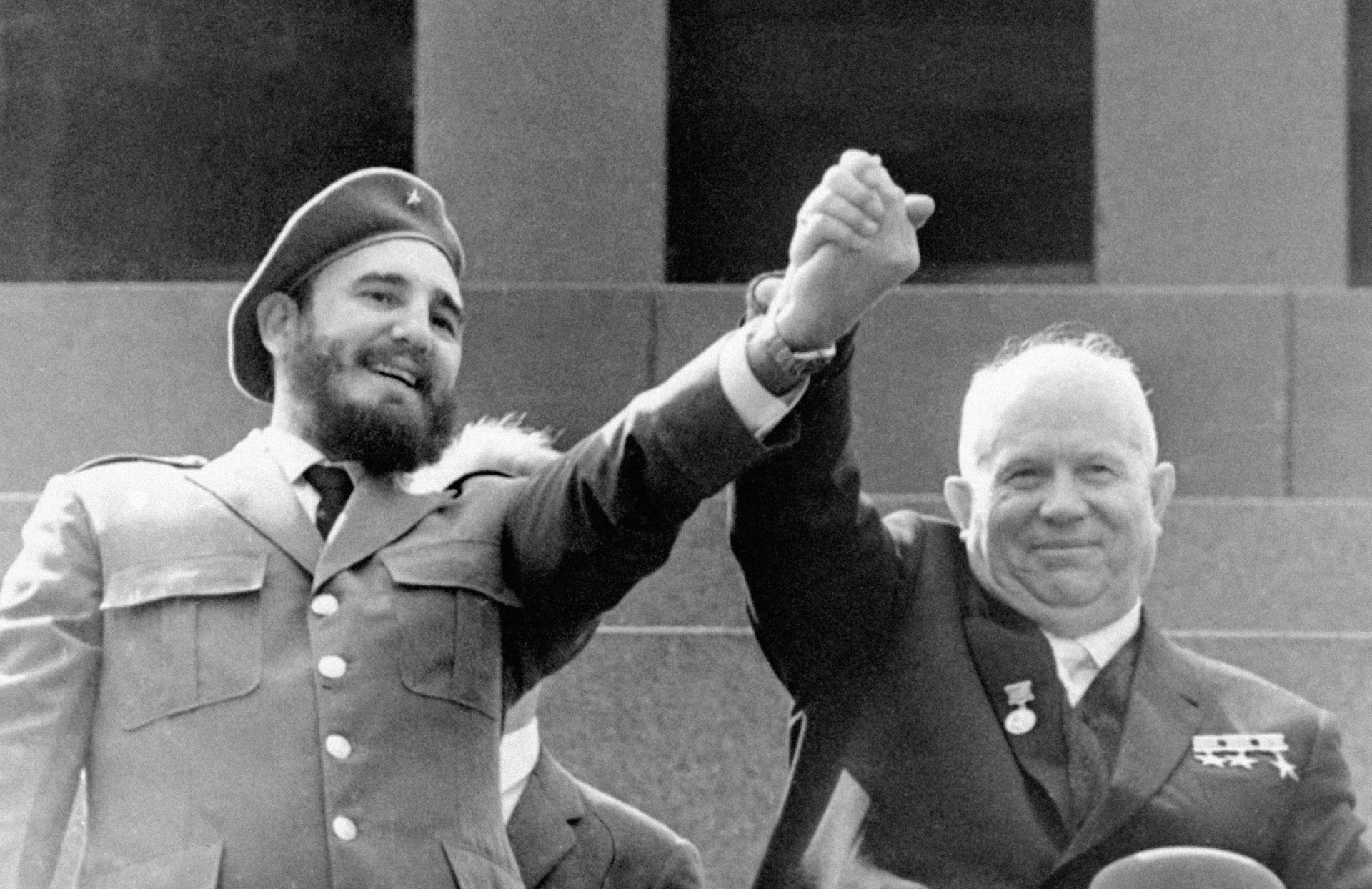
Cuba dictator Fidel Castro and Soviet Premier Nikita Khrushchev clasp hands at the Lenin mausoleum in Moscow’s Red Square on May Day 1963. (TASS via AP)
The relationship between the Cuban DGI, the Soviet KGB, and the Venceremos Brigade was explained in a 1982 Senate Subcommittee hearing on “Security and Terrorism” convened by Sen. Jeremiah Denton (R-AL). In sworn testimony before the subcommittee, Gerardo Peraza, a former high-ranking Cuban official in the DGI who defected to the United States in 1971, said that the Cuban intelligence service was a direct subsidiary of the Soviet Union’s vast intelligence organization.
“The Cuban intelligence service’s structure was placed under the KGB,” Peraza stated. The Cuban branch, however, had a very specific aim.
“The principal function of the Directorate of Intelligence was penetration and recruitment in the United States of America,” Peraza said. With America’s Central Intelligence Agency (CIA) primarily focused on its Soviet counterpart, the smaller Cuban intelligence service could operate with greater impunity, Peraza explained.
The greatest service Cuban intelligence officials provided for their Soviet masters was to entice Americans into betraying their country by helping America’s enemies. The DGI had an easier time recruiting American assets because American radicals felt more affinity for Cuban communists than for Russians. All of this made Cuba’s intelligence apparatus a major asset to the Soviets in their Cold War efforts to defeat the United States.
“The Soviet Union utilizes Cuba because of its great potential in the intelligence field against the United States,” Peraza said. “The Soviet intelligence officers always saw in the Cuban intelligence service a great potential of penetration in the United States, because Cuba is a small country, not a great power, and many people in the United States feel a certain sympathy toward a small country.”
This sympathy coincided with the rise of the New Left movement following the death of Josef Stalin and the revelations about his murderous crimes. Many American radicals sought to distance themselves from the Soviet Union and its atrocities while still maintaining their revolutionary beliefs. This presented a challenge to Soviet intelligence gathering, which in the past could always rely on American leftists to assist the communist cause.
As Collier and Horowitz explained in Destructive Generation, “Castro saw that the American Left, still wary of the U.S.S.R., could be made to support Soviet aims indirectly because if its ties—affective even more than political—with him and his revolution… At the same time he was making Cuba’s economy a satellite of Russia’s, and Cuba’s intelligence services and military forces instruments of the Soviet state, Castro began the creation of what amounted to a new Communist international. …[T]he anti-Soviet attitudes of the New Left and the isolation of the Communist Party had frustrated the penetration efforts of the Soviet intelligence services. But in 1969, Castro worked with American radicals to create the Venceremos Brigades, placing them under the control of Cuban intelligence operatives.”
This arrangement allowed the Cuban officials to get from the Venceremos Brigade members “the first great quantity of information through American citizens that was obtained in the United States,” according to Peraza.
The Brigade also allowed the Cubans to co-opt American radicals as “useful idiots” in planting the communist regime’s propaganda. Collier and Horowitz illustrated this point in an anecdote about Brigade members in the ’70s who were used to promote Castro’s propaganda:
One almost amusing struggle session occurred with members of the North American Congress on Latin America (NACLA), a church-funded group with pro-Castro loyalties, which described its purpose as providing an “intelligence-gathering arm” for the Left and which had helped set up the Venceremos Brigade. A delegation from NACLA came to our editorial offices [at Ramparts magazine] with an article they wanted printed. The piece proposed itself as a report on the progress of “socialist democracy” in Cuba, focusing on the passage of a recently enacted “anti-laziness” law as evidence of the “people’s rule.” The article claimed that more than three million Cubans—a third of the population—had actively participated in the making of the law. We asked the obvious question: If the people’s civic involvement was as high as this, why was the law necessary at all? In the confrontation that followed, the NACLA members told us that because of our “white skin privileges” we had “no right to judge” anything that third world revolutionaries did. In the words of one of the NACLA spokesmen: “Your revolutionary responsibility is to print the piece and shut up about it.”
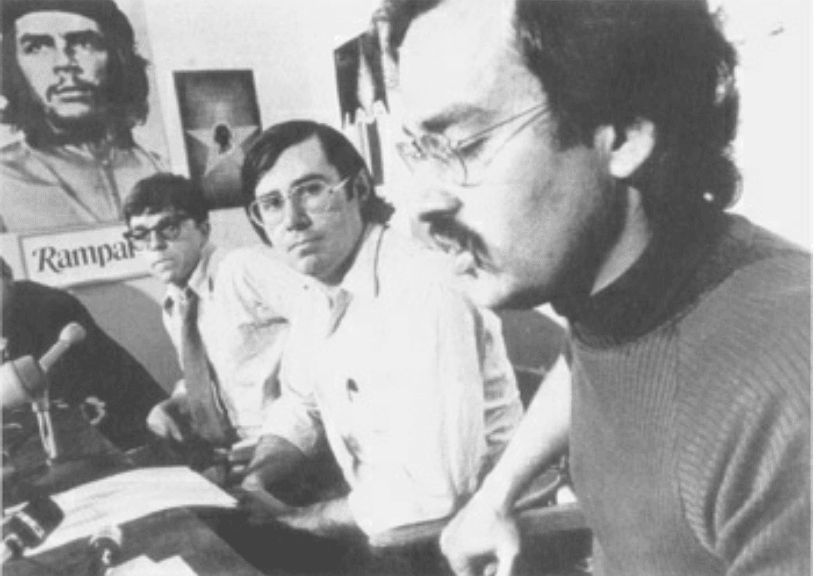
David Horowitz (right) holding a press conference with Peter Collier and Perry Fellwock at the office of Ramparts magazine in San Francisco, 1973. (Courtesy of David Horowitz)
SEEDS FOR A FUTURE POLITICAL HARVEST
The Venceremos Brigade was much more than just an intelligence gathering tool. Its ultimate value was in planting the seeds of a political influencing harvest that Castro’s regime would reap decades later. The Brigade was a mechanism to train future political operatives in the United States who would one day be in a position to assist the communist regime.
Indeed, the 1976 FBI report revealed that the ultimate objective of the Cuban intelligence officials in running the Venceremos Brigade “is the recruitment of individuals who are politically oriented and who someday may obtain a position, elective or appointive, somewhere in the U.S. Government, which would provide the Cuban Government with access to political, economic and military intelligence.”
In the case of Karen Bass, it would seem the Cuban intelligence service’s recruitment has proven successful beyond their wildest dreams, as Bass continues to scale the summits of American political influence.
Bass’s association with Venceremos Brigade has been well documented for decades, as a recent article in Tablet magazine makes clear:
An event blurb in an October 1975 issue of the communist Daily World newspaper describes Bass, then 22, as “leader of the Venceremos Brigade in southern California.” Bass herself explained her work for the brigade to a doctoral candidate working on a 1996 Ph.D. dissertation submitted to the Fielding Institute, titled “Women Activists of Diverse Backgrounds: A Qualitative Study of Perceived Influences and Values.” “Another critical influence for Bass began, at age 19, and spanned the next five years: Cuba,” reads the document, written by Dawn Noggle, who is currently the director of mental health services for the Maricopa County correctional system. “As a ‘brigadista’ and then organizer for the Venceremos Brigades, Karen visited Cuba every 6 months.”
When Tablet magazine reached out to Bass’s office on Monday for comment about her involvement with the Venceremos Brigade, the Congresswoman’s spokesman stressed that Bass “wasn’t a leader” of the Brigade but merely “went with other volunteers to build houses.”
There is a reason why Bass would want to deny all the contemporaneous reports that identified her as the leader of the Los Angeles Brigade.
Former DGI official Peraza explained in his Senate testimony that among the duties of Cuban intelligence officers stationed in Cuba’s diplomatic offices in New York and Washington, DC, was to control the Brigade and select its participants.
This fact was also confirmed in testimony during a 1972 House Subcommittee. An undercover police deputy from New Orleans testified about the vetting process he endured when he applied to join the Venceremos Brigade. “To be a member of the brigade, you had to be confirmed as a Marxist‐Leninist,” he said.
He said getting into the Brigade “required filling out a detailed application, undergoing interviews concerning his political beliefs and three‐and‐a‐half months of twice‐a‐week indoctrination sessions,” the New York Times reported.
This vetting process was especially true for Brigade leaders.
“You don’t get to be the leader of the L.A. Venceremos Brigade unless the Cuban intelligence trusts you,” Horowitz told Breitbart News. “They were run by Cuban intelligence, and you don’t get to have a position of authority in an organization like that without them trusting you. This is not an innocent person. You know, I had acquaintances who were communists. This is a dedicated communist.”
“These people were prepared to do things for Cuban intelligence – attack and spy on the United States. That’s how committed [Bass] was, and I just draw that from her having this official position,” Horowitz said.
Nearly fifty years ago, the Los Angeles Police Department drew the same conclusion about Bass’s eight trips to Cuba in the 1970s.
SURVEILLED BY THE LOS ANGELES POLICE DEPARTMENT
In 1978, the American Civil Liberties Union (ACLU) filed a class action lawsuit against the Los Angeles Police Department (LAPD) and 12 undercover officers with the LAPD’s Public Disorder and Intelligence Division (PDID) for spying on left-wing organizations and activists. In the lead up to the 1983 trial, the ACLU released thousands of pages of police intelligence reports and depositions of the subpoenaed officers to cast the LAPD in a negative light.
In November 1983, Los Angeles Police Chief Daryl Gates decided to turn the tables on the ACLU by releasing information about the left-wing plaintiffs the LAPD had been surveilling. Karen Bass was among the plaintiffs revealed in the police’s document dump.
A Los Angeles Times’ article from November 28, 1983, described the revelations about “plaintiff” Bass:
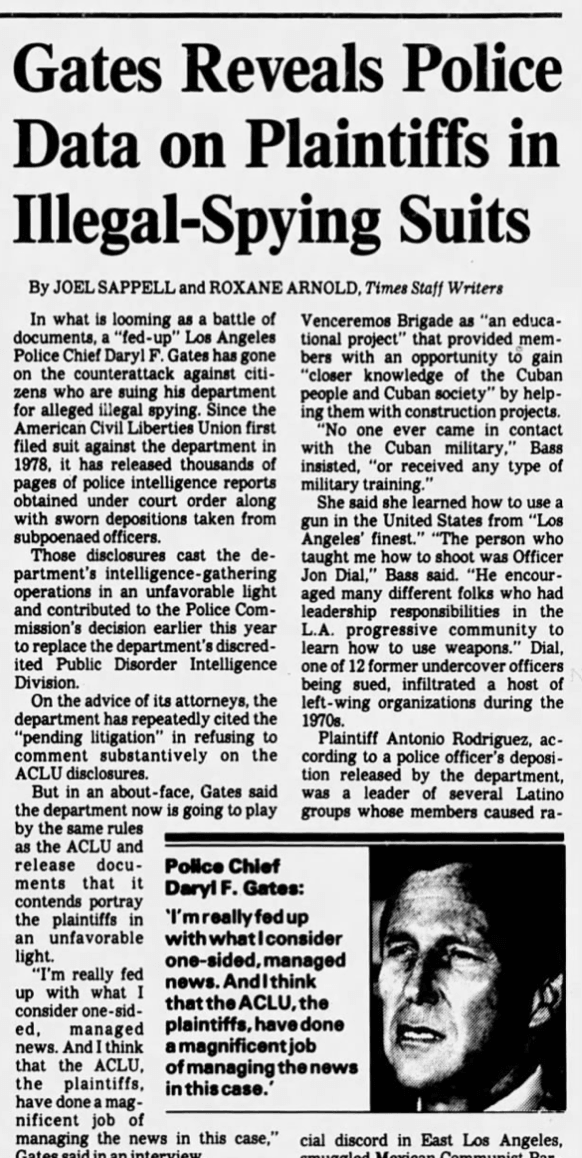
Plaintiff Karen Bass, according to a 1973 intelligence document provided to The Times, “traveled to Cuba with the 6th Contingent of the Venceremos Brigade. The brigade trains revolutionary-prone Americans in terrorist tactics and guerrilla warfare while claiming to harvest sugar cane.”
Bass, characterized as a brigade leader, “returned from Cuba to the USA bringing back propaganda literature,” the document noted without citing the source of this information.
A surprised Bass, now 30 and a physician’s assistant, said her eight trips to Cuba were educational and had nothing to do with terrorism.
“I’m angry and I’m shocked that they would use (this allegation) to try to attempt to smear me personally and the brigade,” Bass said in an interview. She described the Venceremos Brigade as “an educational project” that provided members with an opportunity to gain “closer knowledge of the Cuban people and Cuban society” by helping them with construction projects.
“No one ever came in contact with the Cuban military,” Bass insisted, “or received any type of military training.” She said she learned how to use a gun in the United States from “Los Angeles’ finest.” “The person who taught me how to shoot was Officer Jon Dial,” Bass said. “He encouraged many different folks who had leadership responsibilities in the LA progressive community to learn how to use weapons.” Dial, one of 12 former undercover officers being sued, infiltrated a host of left-wing organizations during the 1970s.
The LAPD eventually settled the lawsuit in 1984 and agreed to disband the unit and destroy many of its records.
In a statement to Tablet magazine Bass’s office dismissed the significance of the LAPD investigation, saying “[t]he Chief of Police fancied himself to be the Los Angeles version of J. Edgar Hoover. He kept files on activists and elected officials including the mayor and members of the city council. Rep. Bass was spied on and harassed by LAPD as were the more than 100 activists that were plaintiffs in lawsuit and that’s why they won.”
Tablet notes that Bass’s decades-long association with the Venceremos Brigade and her surveillance by the LAPD is conspicuously absent from biographical accounts of her activities after the mid-1990s, which is precisely when Bass began to chart a public political career. These omissions are particularly glaring in articles where her history could provide necessary context for her current activities. For example, a New York Times article in June about Bass’s push for police reforms fails to mention that she was once a target of police harassment.
Similarly, a 2016 Los Angeles Times article mentioning Bass’s participation in President Obama’s historic trip to Cuba only vaguely alludes to her time with the Brigade. The article merely notes that Bass “first visited Cuba as a 19-year-old in 1973. She and the group of anti-war civil rights activists she traveled with stayed two months to construct homes, and she returned repeatedly.”
The Times article quotes Bass as saying, “I was young, and Cuba was really hated at that time. To then go 43 years later with the U.S. government and the president of the United States, oh my God. You can only imagine what that will feel like.”
Describing Cuba as “really hated at the time” is an interesting euphemism for a regime assisting America’s enemies at a time when thousands of American men were coming home in body bags from Vietnam. And calling the Brigade a “group of anti-war civil rights activists” is an anodyne description for members of a communist front group controlled by the Cuban intelligence service during one of the hottest years of the Cold War.
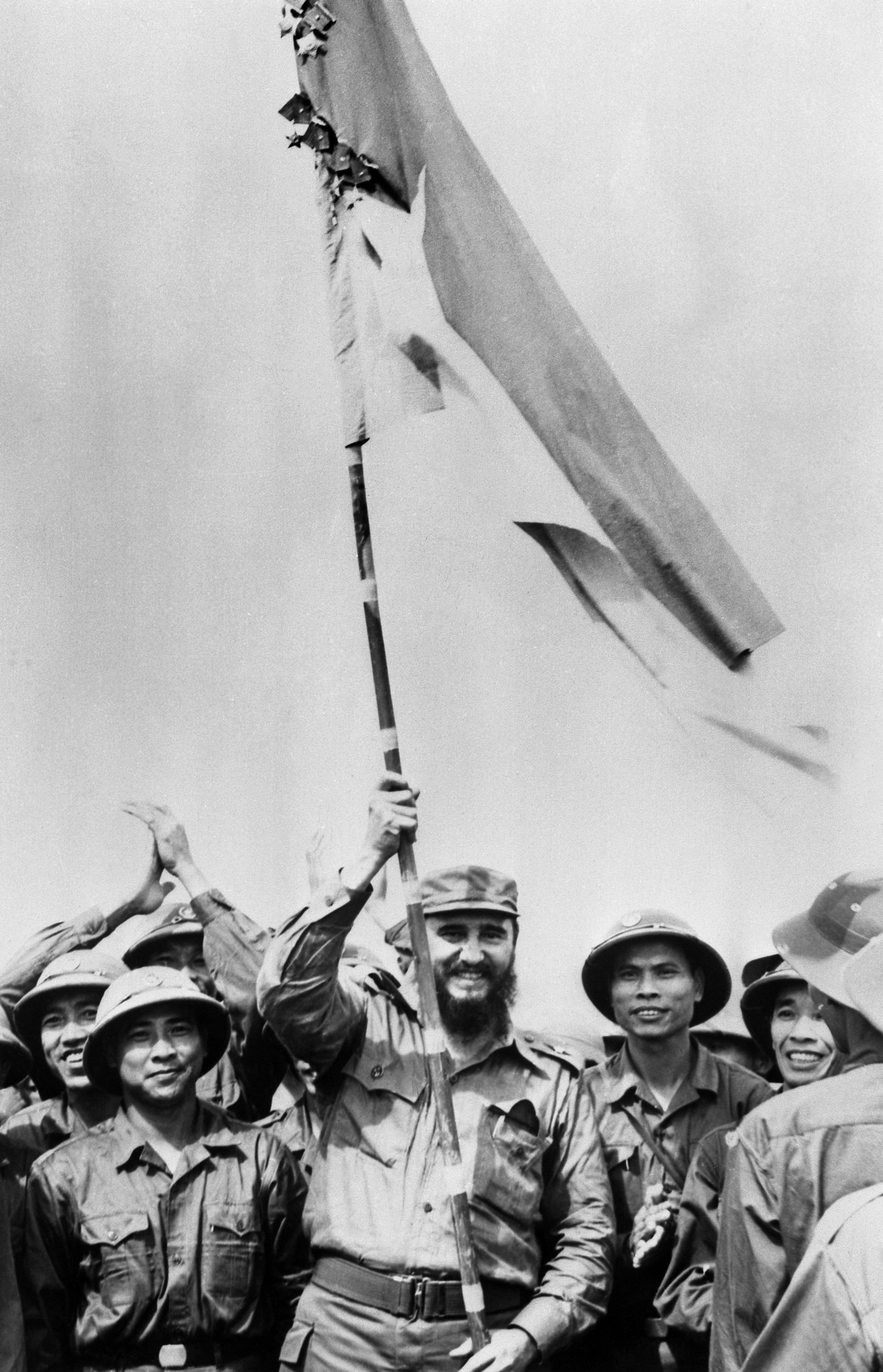
Cuban dictator Fidel Castro posing with communist Viet Cong combatants and waving their flag during a visit to the communist-controlled area of South Vietnam during the Vietnam War, September 1973. (AFP via Getty Images)
“These are people who worked for the Cuban intelligence and the Cuban Communist Party,” Horowitz said of the Venceremos Brigade.
Bass’s eight trips to Cuba in the 1970s spanned much more than just two months and likely involved much more than constructing homes.
It is worth noting that the LAPD police reports on Bass came from an undercover officer embedded with the L.A. Venceremos Brigade which he identified Bass as the leader of. The court may have ruled that this officer’s surveillance of Bass was illegal, but that does not negate the veracity of the information he observed while undercover.
“She had to have been acting as a political agent of the communist regime,” Horowitz said about Bass’s eight trips to Cuba in the 1970s.
It is still unclear what exactly she did in Cuba during all those trips, what training she received there, what propaganda literature she returned with, and what assistance the Cuban regime may have requested of her.
Bass insists that she knew no one in the Brigade who was involved in violence or espionage. “Let me say: Hell no. No, I did not know anybody like that,” she told the The Atlantic in a recent interview, insisting that she “never, ever, ever came near a gun in Cuba, period. Never.”
FEASTING WITH CASTRO WHILE CUBANS STARVED
Bass’s L.A. Venceremos Brigade was part of the 6th contingent (each expedition is numbered as a contingent. Currently, the Brigade is on its 50th contingent.) In a 2015 article in Dissent magazine, Michael Kazin described his experience as a member of the first contingent in 1969.
Kazin notes that the sugar cane harvest was never what this was all about: “[O]ur real reason for being there was to make a political point, as the almost daily coverage we received in Granma, the Communist Party organ, made clear.”
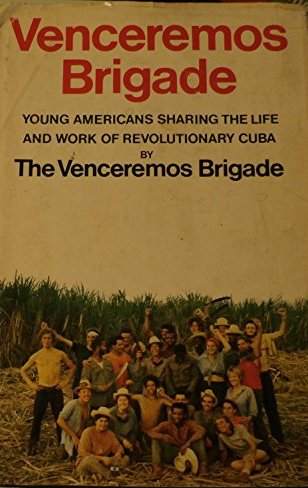
The Americans were serenaded with rock music every morning, and their hosts “treated us to a regimen far more luxurious than that endured by native macheteros. They broke up the workday by bringing us jars of frozen Bulgarian fruit yogurt at mid-morning and then served us a three-course meal at lunch.” In the evenings, the American radicals enjoyed “an excellent dinner (and all the cigars we could smoke),” and they were even joined by “Commandante en Jefe” himself who engaged in one of his infamous hours-long speeches at dinner, according to Kazin.
The young radicals also broke bread with members of the Viet Cong who were in Cuba at the same time. The American leftists were meeting with these enemy combatants just one year after the Tet Offensive, at the height of the Vietnam War.
“One evening, our guests were uniformed soldiers from the National Liberation Front of South Vietnam—better known stateside as the Viet Cong,” Kazin writes. “Through a French interpreter, I had a halting, although pleasant conversation, with one of them—a young man about my age. But the conversation ended shortly after I asked him what the large tricolor medal on his chest signified. The soldier beamed and then responded, in English: ‘Twenty Yankees killed!’”
Bass’s 6th Venceremos contingent was also wined and dined by the communist regime. “We built houses during the day,” she told The Atlantic, “and then we had what they called cultural activities and we called parties. There was great music, rum, dancing. And we toured the country.”
Of course, the “brigadistas” would claim that they were serving the Cuban people, not their dictator. But how would these American radicals being feted by a communist dictator appear to the people bearing the brunt of that dictatorship?
Breitbart News’ International Editor Frances Martel, herself a Cuban American whose family fled Castro’s regime, described what Castro’s policies meant for average Cuban citizens in the 1970s when Bass and her associates were being lavishly entertained by the regime:
The brutality of the 1960s – the internment of Christians and gays in labor camps, “voluntary” labor for anyone considered insufficiently “revolutionary,” hundreds of firing squad murders – had left Cuba significantly devastated by 1970. When Castro announced that year that his promised 10 million tons of sugar cane never grew (because he imprisoned or forced into exile anyone who knew anything about growing crops), what that meant for the average Cuban was increased rationing, little access to basic goods, and no chance of improving their personal conditions, since jobs and companies no longer existed. Children were forcibly indoctrinated into Marxism in schools (with phonetics and math classes based on worship of mass murderers like Che Guevara) and weaponized to spy on their parents. Protein was nearly impossible to come by; the ration card was only good for some eggs and Soviet mystery meat. Many Cubans ate their pets or assorted street animals. There was no freedom of expression, assembly, or travel.
While these American radicals were being feasted by Castro, the Cubans they were purportedly there to help were starving.

A Cuban man stirs a pot heating over an outdoor fire, as he cooks food procured through black market connections due to severe food shortages after Castro assumed power, Sept. 24, 1963. (AP Photo/George Arfeld)
“I didn’t have any illusions that the people in Cuba had the same freedoms I did,” Bass told The Atlantic. “I came home and was protesting everything; I knew that the Cuban people didn’t have the ability to do that.”
And yet she would continue to return to Cuba eight times during the 1970s.
WORKING ‘ARDUOUSLY’ TO BRING THE U.S. ‘CLOSER’ TO COMMUNIST CUBA
In her interview Sunday on MSNBC, Bass again affirmed her fondness for the Cuban people.
“I happen to believe that sometimes the best way to change a regime is through having relations versus not,” she said. “For a country that is 90 miles away, for a policy that we’ve had decades [and] hasn’t worked, I think opening up relationships is the best way to go.”
Whether normalizing relations with Cuba is “the best way to go” is debatable, but what is certain is that Castro’s regime has sought normalization for decades. His courtship of American leftists like Bass eventually paid off when they were in political positions to press for changes in U.S. policy towards the communist regime.
“What they want to do is prop up a communist dictatorship without demanding that they dismantle the dictatorship,” Horowitz said of Bass and the American left’s decades-long push to normalize relations with Castro’s Cuba. “There is a reason why we isolated Cuba. It’s a monster regime.”
A September 25, 2015, article in the official Cuban Communist Party newspaper Granma described a contingent of U.S. politicians, including Bass, meeting with Cuba’s communist dictator Raul Castro while he was in New York City for the United Nations General Assembly, nearly a year after President Obama began the process of normalizing relations with Cuba.
The caption on a photo showing Bass and other Democrat lawmakers posing with Castro describes them as a “bipartisan group of American lawmakers who have maintained favorable positions regarding a change to the American policy towards Cuba and work arduously to bring both countries closer.”
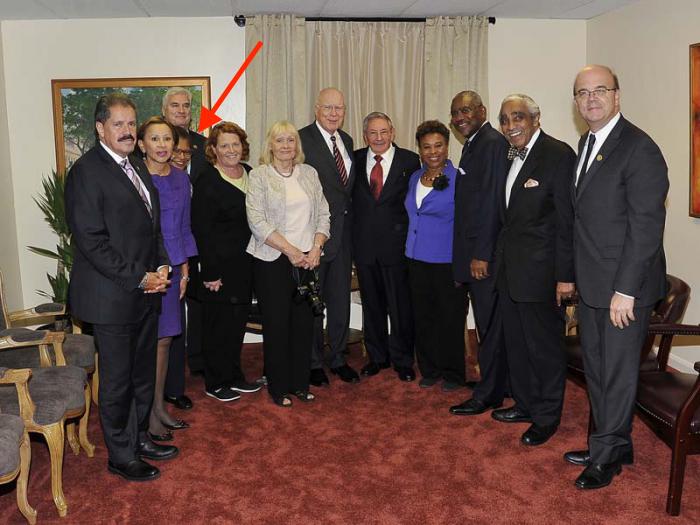
(Source: Granma)
PANTHERS AND CLANDESTINE MAOISTS
The Venceremos Brigade was not the only–or even the most extreme–communist group Bass has been associated with.
In her 2008 book, progressive author Laura Flanders identifies Bass as “a former Black Panther who founded the Community Coalition in L.A. in 1990, ran for office and was elected to the state assembly in 2004.”
“If she’s an L.A. Black Panther – that was Geronimo Pratt territory,” Horowitz told Breitbart. “They were a street gang – the L.A. Panthers. And they were led by a lunatic named Geronimo Pratt, who Huey Newton told me, he said, ‘[Pratt] could only get an erection if he had a knife in his hand’ or something like that. I don’t believe everything Huey said either.”
But even more troubling is Bass’s connection to a loose organization of radical Marxist-Leninists who aligned with the Maoist New Communist Movement. A document surfaced online linking Bass to the Line of March, an “anti-revisionist” Maoist organization founded in Oakland, CA, in 1980 by Irwin Silber. Members of the Line of March operated their network in a deliberately clandestine manner, believing that this type of activism and party organizing needed to be done in secret without formal names or titles. They called themselves “rectificationists.”
Bass’s name and some of her associates are included in a document from the 1980s listing “Consolidated rectification forces.”
When Tablet magazine asked Bass’s office about this document associating her with the Line of March’s “rectification forces,” her spokesperson did not deny the association or the document’s authenticity. The spokesperson’s response was that Bass had simply “attended events.”
“Rectificationists is like reeducation camps in Maoist China,” Horowitz told Breitbart News.
In the 1940s, China’s communist leader Mao Zedong waged a “rectification” campaign to solidify his power and enforce obedience and loyalty to his commands. Among the rectification tactics he used was “thought reform” via “study groups” where dissenters were isolated and attacked into submission.
“Irwin Silber is the founder of Line of March. He came out of the Communist Party and went further left,” Horowitz explained. “He is an anti-revisionist, which means the Communist Party wasn’t radical or anti-American enough [for him].”
Anti-revisionism was a faction of Marxist-Leninists who rejected the revisionist reforms of the Communist Party enacted by Soviet premier Nikita Khrushchev following the death of Stalin. Anti-revisionists aligned with the Stalinist legacy of international communism, though some anti-revisionists, like Silber, identified more with Maoist thought.
“If [Bass] was part of a rectification movement, she’s a Maoist,” Horowitz said. “So she’s swallowing the deaths of 70 million people [who died under Mao]. When America is in a Cold War with China, we don’t want a vice president who is a Maoist.”
In a July 2008 interview, left-wing activist Roxanne Dunbar-Ortiz recalled that Line of March was among the groups that “got radicals into key local positions, which has had a permanent effect on local politics.” In a statement to Tablet magazine, Dunbar-Ortiz noted that “quite a few Line of March activists did go on and work in civic organizations. It became pretty standard.”
“Most of them have blended in relatively smoothly to a kind of left wing of the Democratic Party,” Paul Saba, an archivist of the anti-revisionist movement, told Tablet. “They came out of the wilderness of ultra-leftism and found a place in the political system where they thought they could really make a difference and stayed there ever since.”
Bass’s movement into the political mainstream would also coincide with the omission of her associations with the Venceremos Brigade and communist organizations like Line of March. From the mid-1990s on, the public would come to know Karen Bass as a community organizer fighting a temperance crusade against liquor stores in South Los Angeles.

An Associated Press article from Nov. 16, 1992, about Bass’s anti-liquor store campaign in South Los Angeles.
FROM COMMUNIST FRINGE TO MAINSTREAM PROGRESSIVE ‘AGENDA’
Progressive authors Darnell Hunt and Ana-Christina Ramon wrote approvingly of Bass’s ability to move from being an “outsider” on the radical fringes of leftist activism to an “insider” in mainstream political leadership “with ties to the outside.”
They explained how Bass in the 1990s “was moving from a more leftist, internationalist frame to a progressive one. It was an approach that still sought to make demands of the system but worked to be more strategic in its attempt to move forward particular agendas through policy work.”
During the late 1980s-’90s, Bass increased her community organizing profile in South Los Angeles, speaking regularly to various far-left organizations like the Democratic Socialists of America, organizing a memorial service for South African Communist Party leader (and Stalin admirer) Joe Slovo, campaigning against Apartheid in South Africa, and continuing her fight against liquor stores — all of which laid the ground-work for her successful run for the State Assembly in 2004.
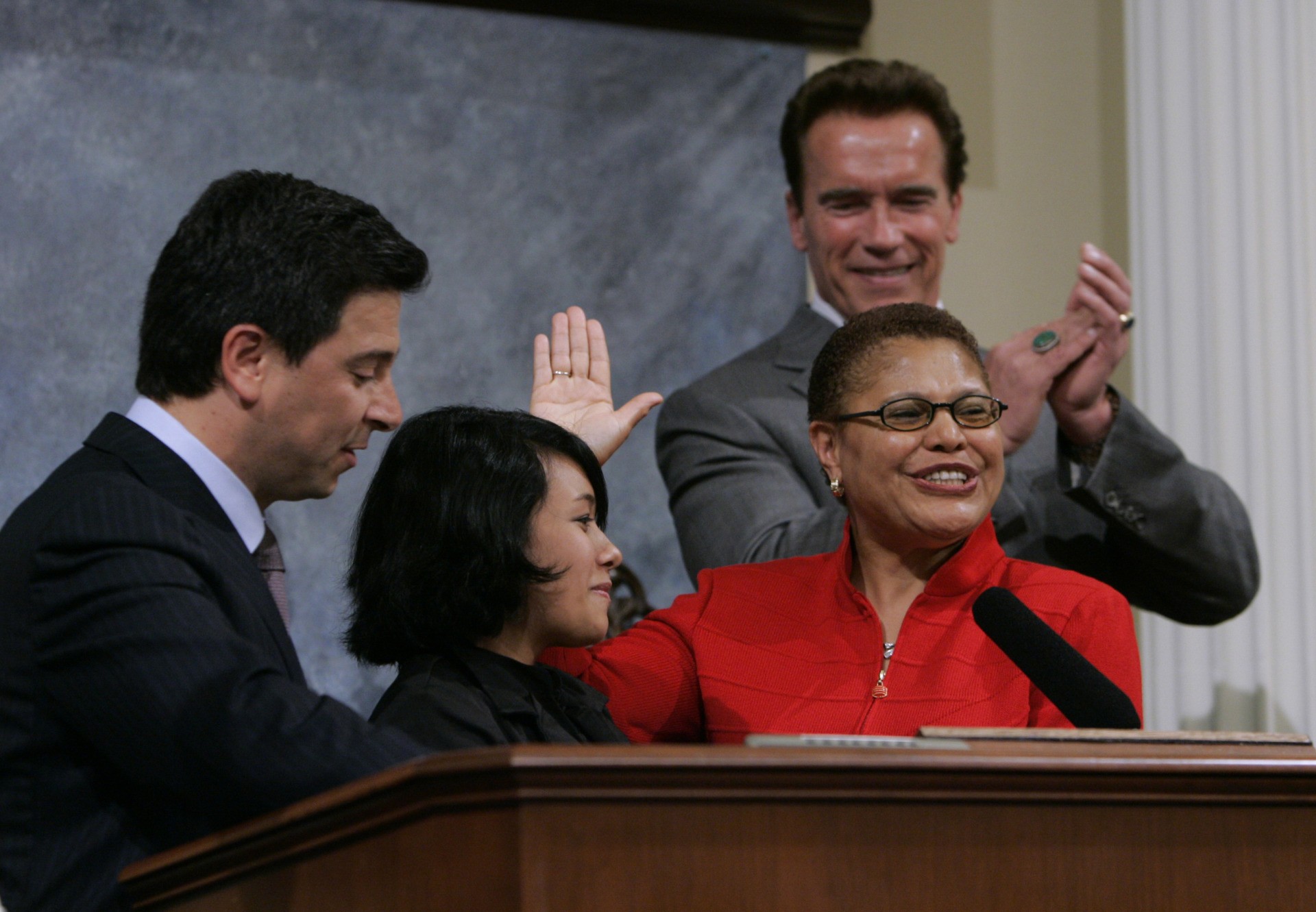
Karen Bass is sworn in as Speaker of the California State Assembly by her predecessor, Assemblyman Fabian Nunez, left, as Gov. Arnold Schwarzenegger applauds during ceremonies at the Capitol in Sacramento, CA, May 13, 2008. (AP Photo/Rich Pedroncelli)
Bass told the authors that her activist background formed the governing “agenda” she brought with her to Sacramento.
“One of the things that I try to do in my job is insert my politics every chance I get and I also try to look for some area where I can bring about change and push the envelope,” Bass said. “One thing that a progressive can do is go in with an agenda, recognizing that there are a whole lot of folks that have no agenda and have no concern about having an agenda.”
“My agenda in Sacramento totally meshes more [with my] former life,” Bass said in 2008.
That political identity, Bass explained, has always been firmly rooted in the Left and leftist movements, not in the more mainstream politics of the Black political establishment, which Bass viewed as too moderate.
“I was never a part of the black establishment,” Bass told the authors. “I guess I am now, but the black organizations, the black leadership, whether you are talking about elected or just community, I was never connected to it and didn’t know half of them until 1990 when I started the Coalition.”
“I defined myself as to the Left and I saw all that as being mainstream and I didn’t really have an interest in being there,” she said.
A REFORMED RADICAL’S SINCERE REMORSE
It is certainly possible—and even laudable—to change your mind about a destructive political ideology that you embraced in your youth. America is, after all, a land of second chances, including second political chances. But sincere remorse requires recognition of the wrong, not concealment and deflection.
Last Sunday, Bass was given the opportunity to denounce Cuba’s murderous regime and walk back her praise for Castro, but instead of condemning his atrocities and acknowledging her role—knowingly or unknowingly—in acting as a tool for Castro’s intelligence service, Bass equivocated.
She conceded that Castro’s legacy was “very troubling” and then breezily acknowledged the “sensitivity” over her use of the term “Commandante en Jefe” because “the translation in Spanish communicated something completely different.”
“She’s never denounced this ruthless sadistic dictatorship in Cuba. She never denounced it. How could you not?” Horowitz, now 81-years-old, asked with weary dismay.
That question is a deeply personal one for the former Ramparts editor. He believes there can be no moral rectitude for former radicals unless they break with Marxism-Leninism and acknowledge the suffering wrought by this destructive ideology.
That is what Horowitz did.
His memoir Radical Son recounts his painful journey from an idealistic New Left leader championing the downtrodden and fighting for civil rights to a disillusioned radical publicly breaking with the left and dedicating his life to exposing its pernicious history.
“What if you belong to a movement and you realize it’s malicious and evil and destructive? The first thing you want to do is warn other people about it…which is what I did,” Horowitz said. “Karen Bass never did. So mentally, [she is] still part of this. It would cost her nothing to denounce the Marxist-Leninist parties that she was a part of. Politically, it would be advantageous.”
It is possible that Bass was influenced by communists like Oneil Cannon because of their admirable work in the civil rights movement, but that is unlikely the full picture when one considers her other communist associations that have nothing to do with human rights or racial equality.
Horowitz sees the anarchists burning and rioting in cities across the country as heirs to the same destructive Marxist-Leninist ideology that animated radicals in the 1960s and ‘70s.
“I thought about this when I was transitioning out [of being a radical],” he said. “If you are a revolutionary, you’re a criminal. I mean, what does a revolutionary mean? It means you reject the whole system – which is also the legal system. That’s why these guys don’t give a damn about burning court houses and things – because in their own minds they’re revolutionaries. These are very dangerous people. They don’t recognize the structures of the society as they exist. If they did, they wouldn’t be revolutionaries. They’d be reformers.”
Whether Bass now thinks of herself as a revolutionary or a reformer remains to be seen, especially if Biden chooses her as his running mate.
Rebecca Mansour is a Senior Editor-at-Large for Breitbart News. Follow her on Twitter at @RAMansour.
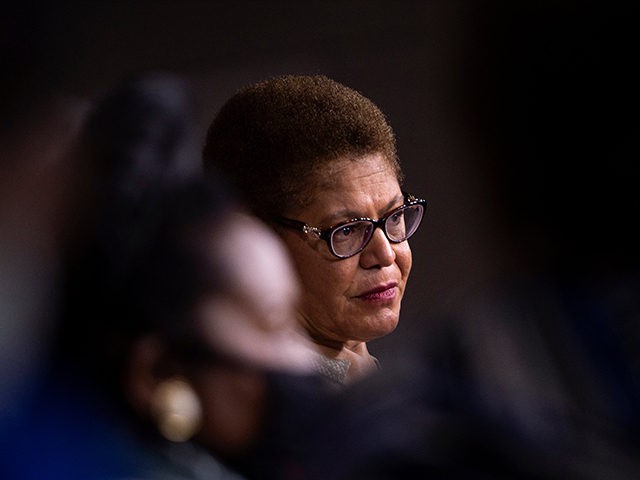

COMMENTS
Please let us know if you're having issues with commenting.